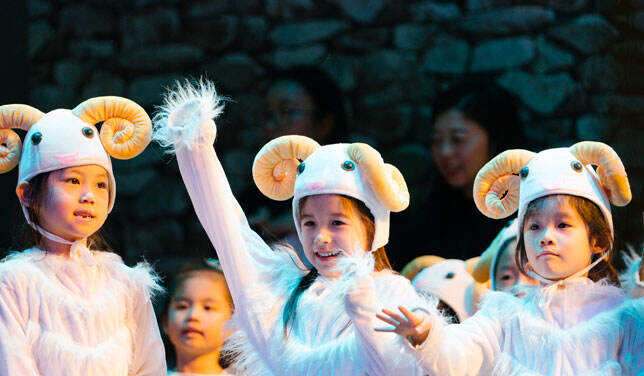Meet the English Department | Part 2
2020-01-08
In Part 1 we heard teachers in the English department share their thoughts on life, literature, language and a love of words in all their different forms. Part 2 picks up where we left off, by asking the other half of the department what their great literary loves and influences are, as well as their ongoing projects that are in the works.
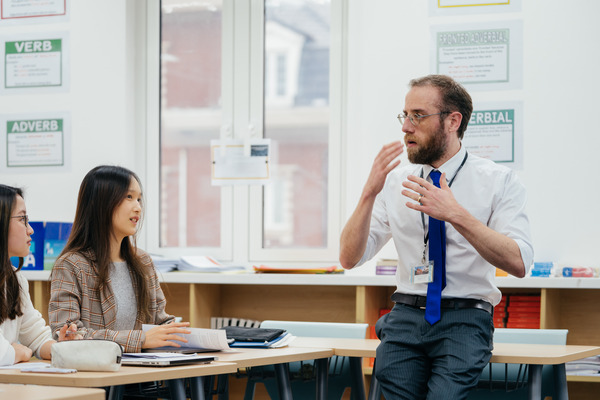 Can you name an author who has influenced you as a teacher, or has generally inspired you to explore and teach English?
Ms Edwards: I remember studying Robert Swindells’ Daz 4 Zoe back in year 9 and I remember it being the first novel I read that made me think of a book as a linguistic construction. I genuinely think it was the book, and he was the author, that switched me on to English and fostered a passion to explore it more deeply and then go another step beyond by teaching it.
Mr Hardy: Cormack McCarthy is a great influence because the way he writes is so powerful and succinct. I can lean into that as a teacher with creative writing or to simply enjoy it as a reader. Stephen Fry’s is another because his prose is so wittily constructed, yet his poetry is also sublime. His Ode Less Travelled is an amazing primer on poetry, as it keeps in all the fun and enjoyment of the process.
Ms North: The social commentary of Charles Dickens makes him relevant and a great read. I’m always reading widely so I can gain new perspectives and I want my pupils to consider how writers can do so much more than just entertain us.
Mr Vaughan: Growing up, English was my only real strength in school so I found that I naturally wanted to pursue a career that allowed me to immerse myself in literature thanks to a long, long list of fantastic authors who really spoke to me. For example, Philip Pullman helps me empathise with pupils because it reminds me of the inherent challenges of being that age. But there are dozens more I could name.
Can you name an author who has influenced you as a teacher, or has generally inspired you to explore and teach English?
Ms Edwards: I remember studying Robert Swindells’ Daz 4 Zoe back in year 9 and I remember it being the first novel I read that made me think of a book as a linguistic construction. I genuinely think it was the book, and he was the author, that switched me on to English and fostered a passion to explore it more deeply and then go another step beyond by teaching it.
Mr Hardy: Cormack McCarthy is a great influence because the way he writes is so powerful and succinct. I can lean into that as a teacher with creative writing or to simply enjoy it as a reader. Stephen Fry’s is another because his prose is so wittily constructed, yet his poetry is also sublime. His Ode Less Travelled is an amazing primer on poetry, as it keeps in all the fun and enjoyment of the process.
Ms North: The social commentary of Charles Dickens makes him relevant and a great read. I’m always reading widely so I can gain new perspectives and I want my pupils to consider how writers can do so much more than just entertain us.
Mr Vaughan: Growing up, English was my only real strength in school so I found that I naturally wanted to pursue a career that allowed me to immerse myself in literature thanks to a long, long list of fantastic authors who really spoke to me. For example, Philip Pullman helps me empathise with pupils because it reminds me of the inherent challenges of being that age. But there are dozens more I could name.
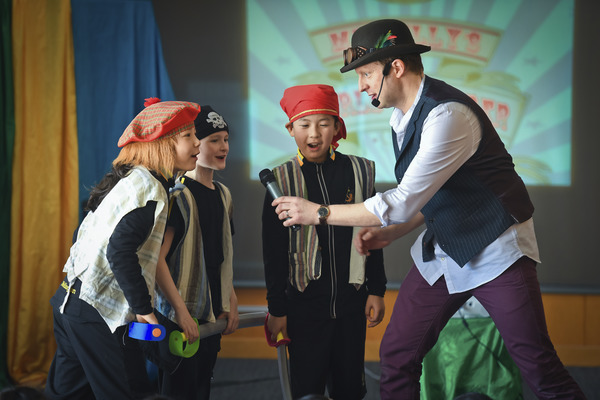 What are you reading right now for pleasure?
Ms Edwards: I have a couple of books on the go right now, which is something I don’t usually do! I’m really enjoying The Ask and the Answer by Patrick Ness, as well as And the Mountains Echoed by Khaled Hosseini. I love taking on recommendations from people whose literary tastes I admire, but there’s never enough time for all of them!
Mr Hardy: Well I’m reading Snail and the Whale for my son, Leon, because he loves it! Parenthood has definitely helped me get into my children’s literature. For myself, I’ve just started on The Sympathizer by Viet Thanh Nguyen. It’s an amazing portrayal of the torn loyalties of the Vietnam War.
Ms North: At the moment I’m reading Red Sorghum by Mo Yan. I really enjoy reading literature that gives me an insight into a culture different from my own and had previously never read anything by a Chinese author. It seems irreverent not to read something by a writer of a country that you’re living in.
Mr Vaughan: I’m giving War and Peace by Leo Tolstoy a go, and I’m half-way through it. I’ve taught history as well as English and right now I’m very into Napoleonic history as well as Russian literature, so I felt it was time to try a classic novel which caters to both of those things. I love how it’s historically grounded yet at the same time such an evocative and human story.
What are you reading right now for pleasure?
Ms Edwards: I have a couple of books on the go right now, which is something I don’t usually do! I’m really enjoying The Ask and the Answer by Patrick Ness, as well as And the Mountains Echoed by Khaled Hosseini. I love taking on recommendations from people whose literary tastes I admire, but there’s never enough time for all of them!
Mr Hardy: Well I’m reading Snail and the Whale for my son, Leon, because he loves it! Parenthood has definitely helped me get into my children’s literature. For myself, I’ve just started on The Sympathizer by Viet Thanh Nguyen. It’s an amazing portrayal of the torn loyalties of the Vietnam War.
Ms North: At the moment I’m reading Red Sorghum by Mo Yan. I really enjoy reading literature that gives me an insight into a culture different from my own and had previously never read anything by a Chinese author. It seems irreverent not to read something by a writer of a country that you’re living in.
Mr Vaughan: I’m giving War and Peace by Leo Tolstoy a go, and I’m half-way through it. I’ve taught history as well as English and right now I’m very into Napoleonic history as well as Russian literature, so I felt it was time to try a classic novel which caters to both of those things. I love how it’s historically grounded yet at the same time such an evocative and human story.
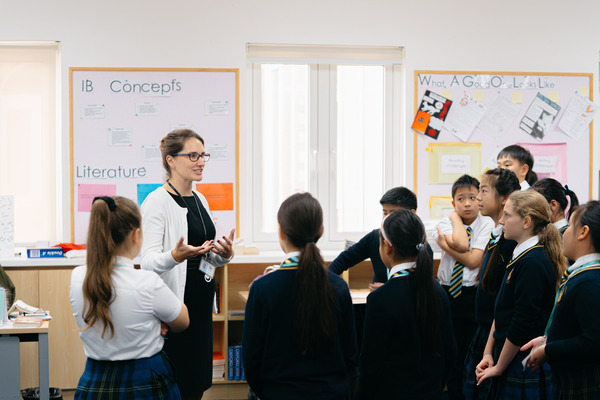 Why do you feel it’s important for everyone to have a love of literature and language?
Ms Edwards: What are we without language? The ability to understand and participate in the discussion of complex concepts, to express yourself with confidence and precision, is at the foundation of our subject. English is more than books, language and literature is more than words, it’s about unlocking pretty much every mystery that surrounds us. It allows us to understand the world and each other – writing something down and having someone else read it is probably the closest thing we’ll ever have to telepathy. In short, language makes us better people.
Mr Hardy: It enriches life, it’s as simple as that. In all aspects of life, in the highs, lows, the known and unknown, literature and language have a part to play in helping you understand what’s happening.
Ms North: It’s so connected to our everyday lives. Literature gives us so many different perspectives into the lives of others. For me, I think that was borne out early in my life from listening to my grandparents and their friends tell me stories of their lives; lives I could never experience but whose reality was still almost tangible because of the way they spoke about them.
Mr Vaughan: We need language to interact with one another on any meaningful level, and we always will. No matter what you want to do with your life, if you want to be successful you have to get to grips with language by exploring it, and to explore language you have to explore literature. While you can’t force someone to love something, I think that all pupils love language whether they realise it or not. You can’t enjoy film, or theatre, or comic books, or any creative literary work without loving language on some level.
Why do you feel it’s important for everyone to have a love of literature and language?
Ms Edwards: What are we without language? The ability to understand and participate in the discussion of complex concepts, to express yourself with confidence and precision, is at the foundation of our subject. English is more than books, language and literature is more than words, it’s about unlocking pretty much every mystery that surrounds us. It allows us to understand the world and each other – writing something down and having someone else read it is probably the closest thing we’ll ever have to telepathy. In short, language makes us better people.
Mr Hardy: It enriches life, it’s as simple as that. In all aspects of life, in the highs, lows, the known and unknown, literature and language have a part to play in helping you understand what’s happening.
Ms North: It’s so connected to our everyday lives. Literature gives us so many different perspectives into the lives of others. For me, I think that was borne out early in my life from listening to my grandparents and their friends tell me stories of their lives; lives I could never experience but whose reality was still almost tangible because of the way they spoke about them.
Mr Vaughan: We need language to interact with one another on any meaningful level, and we always will. No matter what you want to do with your life, if you want to be successful you have to get to grips with language by exploring it, and to explore language you have to explore literature. While you can’t force someone to love something, I think that all pupils love language whether they realise it or not. You can’t enjoy film, or theatre, or comic books, or any creative literary work without loving language on some level.
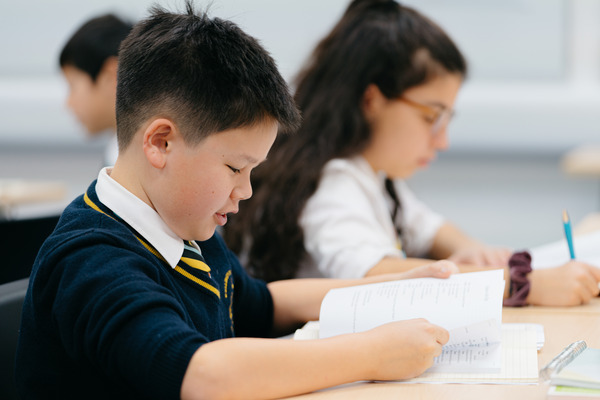 What is it that you really love about teaching English? Why do you choose to do it?
Ms Edwards: I love the curiosity of my pupils, they are so eager to ask questions and explore, but they marry that curiosity to a growing intelligence that allows them to make highly insightful comments and observations, and they’re not afraid to make mistakes! They are investigating their world, and I love seeing their responses when something important falls into place for them.
Mr Hardy: When my pupils really tap into something they enjoy, there’s no better feeling. I love showing them new ideas, new ways of thinking, and giving them the means to express themselves more clearly and authentically.
Ms North: Teaching English allows me to get to know pupils in a way that certain other subjects don’t. I love seeing the moment when a text (of any kind) makes an emotional connection with my pupils. It’s an absolute joy to hear them arguing over the motivations of a character or the choices of an author, because it makes them question their own world a little bit more than they did when they came into the lesson.
Mr Vaughan: No two days are the same, ever. Every pupil is different so every time I teach a text, even one I’ve taught many times before, I always get something new and satisfying out of it. Every time I get to look at each text through a new lens and it just keeps my job so fresh and genuinely exciting. It’s never boring – that’s the short answer!
What is it that you really love about teaching English? Why do you choose to do it?
Ms Edwards: I love the curiosity of my pupils, they are so eager to ask questions and explore, but they marry that curiosity to a growing intelligence that allows them to make highly insightful comments and observations, and they’re not afraid to make mistakes! They are investigating their world, and I love seeing their responses when something important falls into place for them.
Mr Hardy: When my pupils really tap into something they enjoy, there’s no better feeling. I love showing them new ideas, new ways of thinking, and giving them the means to express themselves more clearly and authentically.
Ms North: Teaching English allows me to get to know pupils in a way that certain other subjects don’t. I love seeing the moment when a text (of any kind) makes an emotional connection with my pupils. It’s an absolute joy to hear them arguing over the motivations of a character or the choices of an author, because it makes them question their own world a little bit more than they did when they came into the lesson.
Mr Vaughan: No two days are the same, ever. Every pupil is different so every time I teach a text, even one I’ve taught many times before, I always get something new and satisfying out of it. Every time I get to look at each text through a new lens and it just keeps my job so fresh and genuinely exciting. It’s never boring – that’s the short answer!
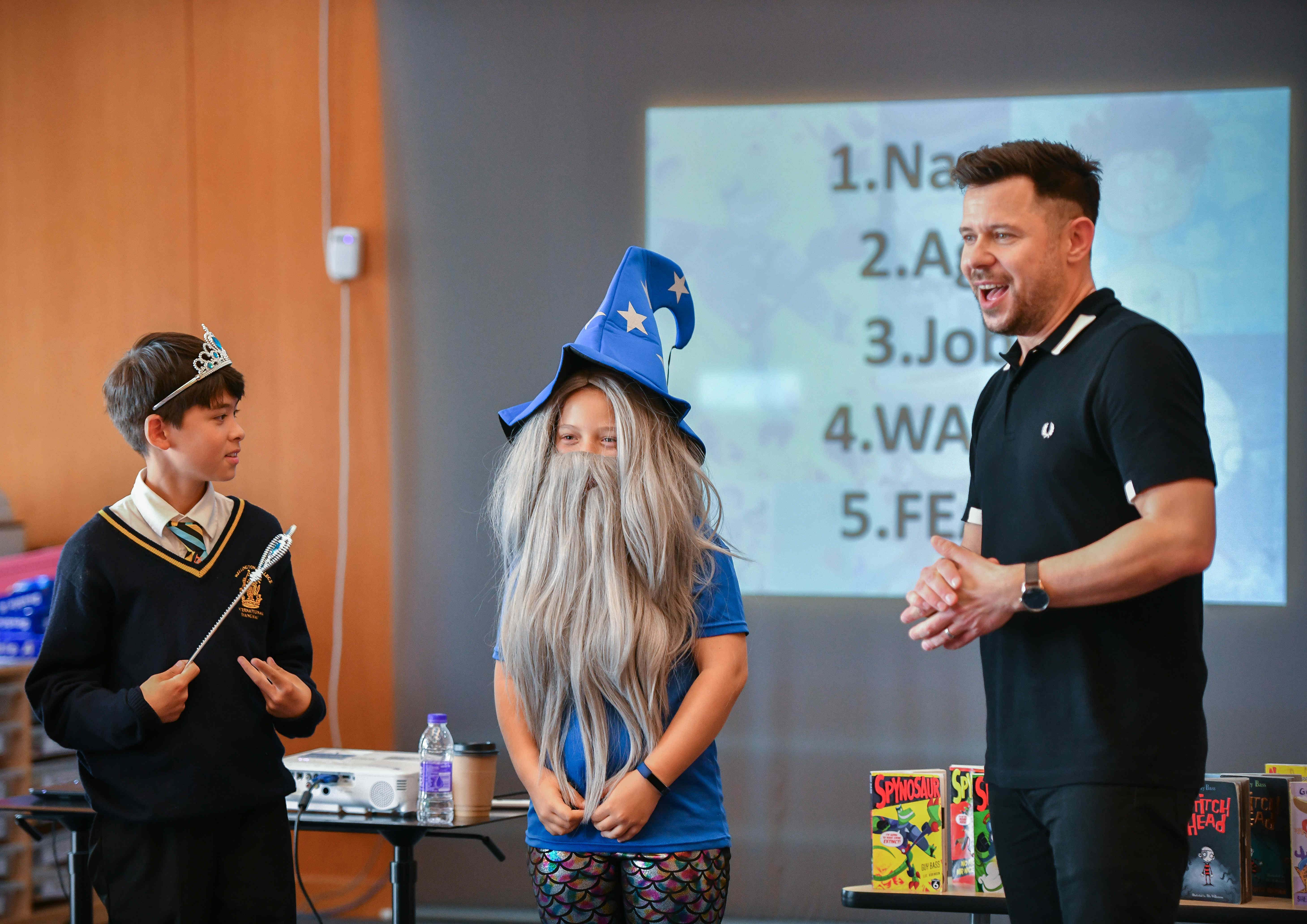 Can you highlight an English activity that you’ve led outside of general classes that your pupils really responded to?
Ms Edwards: Last year I very much enjoyed running the poetry club and I think the blackout poetry (take a text and make a poem by purposefully ‘blacking out’ parts of it) was an absolute triumph. The pupils came up with some amazing stuff, some of it very avant-garde!
Mr Hardy: I did a 48-hour film festival with pupils here at Wellington, that was a blast for everyone. They got their briefing on Friday, shot the films on Saturday, edited on Sunday and had an actual film to show for it after one intense weekend. It showed them just how easy it is to create a story when your mind is focused on it. On the flipside, it also showed them the importance of craft and the effort needed to hone an idea into something special.
Ms North: I have previously been involved in the Hong Kong Young Writers Award which is a creative writing competition in Asia. Pupils learned how to perfect their craft and to consider how different choices of language or structure could impact their writing to the extent where it would or wouldn’t be published. That level of self-awareness in their writing gave them a lot of satisfaction.
Mr Vaughan: I led a drama society in my previous school, where pupils reinterpreted texts as a dramatic piece, and it led to so many opportunities for pretty wild creativity but still grounded in literary analysis. I loved seeing them experiment and approach texts in a totally original manner.
Can you highlight an English activity that you’ve led outside of general classes that your pupils really responded to?
Ms Edwards: Last year I very much enjoyed running the poetry club and I think the blackout poetry (take a text and make a poem by purposefully ‘blacking out’ parts of it) was an absolute triumph. The pupils came up with some amazing stuff, some of it very avant-garde!
Mr Hardy: I did a 48-hour film festival with pupils here at Wellington, that was a blast for everyone. They got their briefing on Friday, shot the films on Saturday, edited on Sunday and had an actual film to show for it after one intense weekend. It showed them just how easy it is to create a story when your mind is focused on it. On the flipside, it also showed them the importance of craft and the effort needed to hone an idea into something special.
Ms North: I have previously been involved in the Hong Kong Young Writers Award which is a creative writing competition in Asia. Pupils learned how to perfect their craft and to consider how different choices of language or structure could impact their writing to the extent where it would or wouldn’t be published. That level of self-awareness in their writing gave them a lot of satisfaction.
Mr Vaughan: I led a drama society in my previous school, where pupils reinterpreted texts as a dramatic piece, and it led to so many opportunities for pretty wild creativity but still grounded in literary analysis. I loved seeing them experiment and approach texts in a totally original manner.
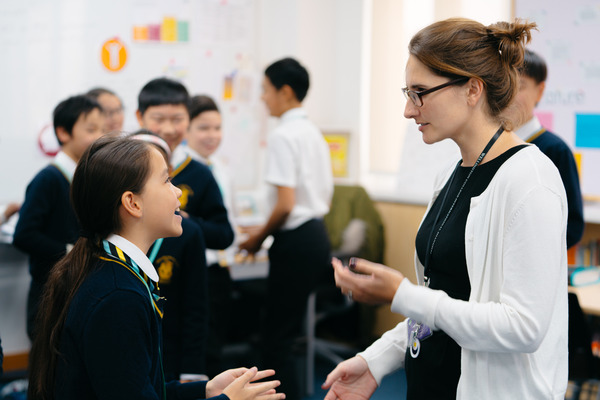 Is there anything you’re doing this year at Wellington that you’re particularly excited about? Do you have any passion projects in the works?
Ms Edwards: This year I’m co-running debate club, and it’s early days but the level of interest is already very high indeed. The first scheduled debate will focus on nuclear energy and I’m very keen to see what the pupils can produce for their opening clash of wits and persuasive abilities.
Mr Hardy: Right now I’m running a creative writing group for Upper Prep School, and we’ve already had two anthologies out – they’re in the library for anyone to go and read. They’ve shown wonderful range and I’m hoping to expand the group in the future, maybe with parents coming in for readings.
Mr Vaughan: I’m hoping to set up a book club that allows pupils to enjoy discussing any texts they like in a more relaxed, low-pressure environment. What we do in the classroom is of course essential but sometimes it’s nice to be able to just have a chat about books you enjoyed, purely for its own sake rather than for honing your literary skills in any kind of deliberate manner.
We hope you enjoyed our two-part series of interviews with the English department and are looking forward to seeing some of the many creative projects and activities that they the English department is leading throughout the rest of the academic year.
More relevant articles :
Is there anything you’re doing this year at Wellington that you’re particularly excited about? Do you have any passion projects in the works?
Ms Edwards: This year I’m co-running debate club, and it’s early days but the level of interest is already very high indeed. The first scheduled debate will focus on nuclear energy and I’m very keen to see what the pupils can produce for their opening clash of wits and persuasive abilities.
Mr Hardy: Right now I’m running a creative writing group for Upper Prep School, and we’ve already had two anthologies out – they’re in the library for anyone to go and read. They’ve shown wonderful range and I’m hoping to expand the group in the future, maybe with parents coming in for readings.
Mr Vaughan: I’m hoping to set up a book club that allows pupils to enjoy discussing any texts they like in a more relaxed, low-pressure environment. What we do in the classroom is of course essential but sometimes it’s nice to be able to just have a chat about books you enjoyed, purely for its own sake rather than for honing your literary skills in any kind of deliberate manner.
We hope you enjoyed our two-part series of interviews with the English department and are looking forward to seeing some of the many creative projects and activities that they the English department is leading throughout the rest of the academic year.
More relevant articles :
 Can you name an author who has influenced you as a teacher, or has generally inspired you to explore and teach English?
Ms Edwards: I remember studying Robert Swindells’ Daz 4 Zoe back in year 9 and I remember it being the first novel I read that made me think of a book as a linguistic construction. I genuinely think it was the book, and he was the author, that switched me on to English and fostered a passion to explore it more deeply and then go another step beyond by teaching it.
Mr Hardy: Cormack McCarthy is a great influence because the way he writes is so powerful and succinct. I can lean into that as a teacher with creative writing or to simply enjoy it as a reader. Stephen Fry’s is another because his prose is so wittily constructed, yet his poetry is also sublime. His Ode Less Travelled is an amazing primer on poetry, as it keeps in all the fun and enjoyment of the process.
Ms North: The social commentary of Charles Dickens makes him relevant and a great read. I’m always reading widely so I can gain new perspectives and I want my pupils to consider how writers can do so much more than just entertain us.
Mr Vaughan: Growing up, English was my only real strength in school so I found that I naturally wanted to pursue a career that allowed me to immerse myself in literature thanks to a long, long list of fantastic authors who really spoke to me. For example, Philip Pullman helps me empathise with pupils because it reminds me of the inherent challenges of being that age. But there are dozens more I could name.
Can you name an author who has influenced you as a teacher, or has generally inspired you to explore and teach English?
Ms Edwards: I remember studying Robert Swindells’ Daz 4 Zoe back in year 9 and I remember it being the first novel I read that made me think of a book as a linguistic construction. I genuinely think it was the book, and he was the author, that switched me on to English and fostered a passion to explore it more deeply and then go another step beyond by teaching it.
Mr Hardy: Cormack McCarthy is a great influence because the way he writes is so powerful and succinct. I can lean into that as a teacher with creative writing or to simply enjoy it as a reader. Stephen Fry’s is another because his prose is so wittily constructed, yet his poetry is also sublime. His Ode Less Travelled is an amazing primer on poetry, as it keeps in all the fun and enjoyment of the process.
Ms North: The social commentary of Charles Dickens makes him relevant and a great read. I’m always reading widely so I can gain new perspectives and I want my pupils to consider how writers can do so much more than just entertain us.
Mr Vaughan: Growing up, English was my only real strength in school so I found that I naturally wanted to pursue a career that allowed me to immerse myself in literature thanks to a long, long list of fantastic authors who really spoke to me. For example, Philip Pullman helps me empathise with pupils because it reminds me of the inherent challenges of being that age. But there are dozens more I could name.
 What are you reading right now for pleasure?
Ms Edwards: I have a couple of books on the go right now, which is something I don’t usually do! I’m really enjoying The Ask and the Answer by Patrick Ness, as well as And the Mountains Echoed by Khaled Hosseini. I love taking on recommendations from people whose literary tastes I admire, but there’s never enough time for all of them!
Mr Hardy: Well I’m reading Snail and the Whale for my son, Leon, because he loves it! Parenthood has definitely helped me get into my children’s literature. For myself, I’ve just started on The Sympathizer by Viet Thanh Nguyen. It’s an amazing portrayal of the torn loyalties of the Vietnam War.
Ms North: At the moment I’m reading Red Sorghum by Mo Yan. I really enjoy reading literature that gives me an insight into a culture different from my own and had previously never read anything by a Chinese author. It seems irreverent not to read something by a writer of a country that you’re living in.
Mr Vaughan: I’m giving War and Peace by Leo Tolstoy a go, and I’m half-way through it. I’ve taught history as well as English and right now I’m very into Napoleonic history as well as Russian literature, so I felt it was time to try a classic novel which caters to both of those things. I love how it’s historically grounded yet at the same time such an evocative and human story.
What are you reading right now for pleasure?
Ms Edwards: I have a couple of books on the go right now, which is something I don’t usually do! I’m really enjoying The Ask and the Answer by Patrick Ness, as well as And the Mountains Echoed by Khaled Hosseini. I love taking on recommendations from people whose literary tastes I admire, but there’s never enough time for all of them!
Mr Hardy: Well I’m reading Snail and the Whale for my son, Leon, because he loves it! Parenthood has definitely helped me get into my children’s literature. For myself, I’ve just started on The Sympathizer by Viet Thanh Nguyen. It’s an amazing portrayal of the torn loyalties of the Vietnam War.
Ms North: At the moment I’m reading Red Sorghum by Mo Yan. I really enjoy reading literature that gives me an insight into a culture different from my own and had previously never read anything by a Chinese author. It seems irreverent not to read something by a writer of a country that you’re living in.
Mr Vaughan: I’m giving War and Peace by Leo Tolstoy a go, and I’m half-way through it. I’ve taught history as well as English and right now I’m very into Napoleonic history as well as Russian literature, so I felt it was time to try a classic novel which caters to both of those things. I love how it’s historically grounded yet at the same time such an evocative and human story.
 Why do you feel it’s important for everyone to have a love of literature and language?
Ms Edwards: What are we without language? The ability to understand and participate in the discussion of complex concepts, to express yourself with confidence and precision, is at the foundation of our subject. English is more than books, language and literature is more than words, it’s about unlocking pretty much every mystery that surrounds us. It allows us to understand the world and each other – writing something down and having someone else read it is probably the closest thing we’ll ever have to telepathy. In short, language makes us better people.
Mr Hardy: It enriches life, it’s as simple as that. In all aspects of life, in the highs, lows, the known and unknown, literature and language have a part to play in helping you understand what’s happening.
Ms North: It’s so connected to our everyday lives. Literature gives us so many different perspectives into the lives of others. For me, I think that was borne out early in my life from listening to my grandparents and their friends tell me stories of their lives; lives I could never experience but whose reality was still almost tangible because of the way they spoke about them.
Mr Vaughan: We need language to interact with one another on any meaningful level, and we always will. No matter what you want to do with your life, if you want to be successful you have to get to grips with language by exploring it, and to explore language you have to explore literature. While you can’t force someone to love something, I think that all pupils love language whether they realise it or not. You can’t enjoy film, or theatre, or comic books, or any creative literary work without loving language on some level.
Why do you feel it’s important for everyone to have a love of literature and language?
Ms Edwards: What are we without language? The ability to understand and participate in the discussion of complex concepts, to express yourself with confidence and precision, is at the foundation of our subject. English is more than books, language and literature is more than words, it’s about unlocking pretty much every mystery that surrounds us. It allows us to understand the world and each other – writing something down and having someone else read it is probably the closest thing we’ll ever have to telepathy. In short, language makes us better people.
Mr Hardy: It enriches life, it’s as simple as that. In all aspects of life, in the highs, lows, the known and unknown, literature and language have a part to play in helping you understand what’s happening.
Ms North: It’s so connected to our everyday lives. Literature gives us so many different perspectives into the lives of others. For me, I think that was borne out early in my life from listening to my grandparents and their friends tell me stories of their lives; lives I could never experience but whose reality was still almost tangible because of the way they spoke about them.
Mr Vaughan: We need language to interact with one another on any meaningful level, and we always will. No matter what you want to do with your life, if you want to be successful you have to get to grips with language by exploring it, and to explore language you have to explore literature. While you can’t force someone to love something, I think that all pupils love language whether they realise it or not. You can’t enjoy film, or theatre, or comic books, or any creative literary work without loving language on some level.
 What is it that you really love about teaching English? Why do you choose to do it?
Ms Edwards: I love the curiosity of my pupils, they are so eager to ask questions and explore, but they marry that curiosity to a growing intelligence that allows them to make highly insightful comments and observations, and they’re not afraid to make mistakes! They are investigating their world, and I love seeing their responses when something important falls into place for them.
Mr Hardy: When my pupils really tap into something they enjoy, there’s no better feeling. I love showing them new ideas, new ways of thinking, and giving them the means to express themselves more clearly and authentically.
Ms North: Teaching English allows me to get to know pupils in a way that certain other subjects don’t. I love seeing the moment when a text (of any kind) makes an emotional connection with my pupils. It’s an absolute joy to hear them arguing over the motivations of a character or the choices of an author, because it makes them question their own world a little bit more than they did when they came into the lesson.
Mr Vaughan: No two days are the same, ever. Every pupil is different so every time I teach a text, even one I’ve taught many times before, I always get something new and satisfying out of it. Every time I get to look at each text through a new lens and it just keeps my job so fresh and genuinely exciting. It’s never boring – that’s the short answer!
What is it that you really love about teaching English? Why do you choose to do it?
Ms Edwards: I love the curiosity of my pupils, they are so eager to ask questions and explore, but they marry that curiosity to a growing intelligence that allows them to make highly insightful comments and observations, and they’re not afraid to make mistakes! They are investigating their world, and I love seeing their responses when something important falls into place for them.
Mr Hardy: When my pupils really tap into something they enjoy, there’s no better feeling. I love showing them new ideas, new ways of thinking, and giving them the means to express themselves more clearly and authentically.
Ms North: Teaching English allows me to get to know pupils in a way that certain other subjects don’t. I love seeing the moment when a text (of any kind) makes an emotional connection with my pupils. It’s an absolute joy to hear them arguing over the motivations of a character or the choices of an author, because it makes them question their own world a little bit more than they did when they came into the lesson.
Mr Vaughan: No two days are the same, ever. Every pupil is different so every time I teach a text, even one I’ve taught many times before, I always get something new and satisfying out of it. Every time I get to look at each text through a new lens and it just keeps my job so fresh and genuinely exciting. It’s never boring – that’s the short answer!
 Can you highlight an English activity that you’ve led outside of general classes that your pupils really responded to?
Ms Edwards: Last year I very much enjoyed running the poetry club and I think the blackout poetry (take a text and make a poem by purposefully ‘blacking out’ parts of it) was an absolute triumph. The pupils came up with some amazing stuff, some of it very avant-garde!
Mr Hardy: I did a 48-hour film festival with pupils here at Wellington, that was a blast for everyone. They got their briefing on Friday, shot the films on Saturday, edited on Sunday and had an actual film to show for it after one intense weekend. It showed them just how easy it is to create a story when your mind is focused on it. On the flipside, it also showed them the importance of craft and the effort needed to hone an idea into something special.
Ms North: I have previously been involved in the Hong Kong Young Writers Award which is a creative writing competition in Asia. Pupils learned how to perfect their craft and to consider how different choices of language or structure could impact their writing to the extent where it would or wouldn’t be published. That level of self-awareness in their writing gave them a lot of satisfaction.
Mr Vaughan: I led a drama society in my previous school, where pupils reinterpreted texts as a dramatic piece, and it led to so many opportunities for pretty wild creativity but still grounded in literary analysis. I loved seeing them experiment and approach texts in a totally original manner.
Can you highlight an English activity that you’ve led outside of general classes that your pupils really responded to?
Ms Edwards: Last year I very much enjoyed running the poetry club and I think the blackout poetry (take a text and make a poem by purposefully ‘blacking out’ parts of it) was an absolute triumph. The pupils came up with some amazing stuff, some of it very avant-garde!
Mr Hardy: I did a 48-hour film festival with pupils here at Wellington, that was a blast for everyone. They got their briefing on Friday, shot the films on Saturday, edited on Sunday and had an actual film to show for it after one intense weekend. It showed them just how easy it is to create a story when your mind is focused on it. On the flipside, it also showed them the importance of craft and the effort needed to hone an idea into something special.
Ms North: I have previously been involved in the Hong Kong Young Writers Award which is a creative writing competition in Asia. Pupils learned how to perfect their craft and to consider how different choices of language or structure could impact their writing to the extent where it would or wouldn’t be published. That level of self-awareness in their writing gave them a lot of satisfaction.
Mr Vaughan: I led a drama society in my previous school, where pupils reinterpreted texts as a dramatic piece, and it led to so many opportunities for pretty wild creativity but still grounded in literary analysis. I loved seeing them experiment and approach texts in a totally original manner.
 Is there anything you’re doing this year at Wellington that you’re particularly excited about? Do you have any passion projects in the works?
Ms Edwards: This year I’m co-running debate club, and it’s early days but the level of interest is already very high indeed. The first scheduled debate will focus on nuclear energy and I’m very keen to see what the pupils can produce for their opening clash of wits and persuasive abilities.
Mr Hardy: Right now I’m running a creative writing group for Upper Prep School, and we’ve already had two anthologies out – they’re in the library for anyone to go and read. They’ve shown wonderful range and I’m hoping to expand the group in the future, maybe with parents coming in for readings.
Mr Vaughan: I’m hoping to set up a book club that allows pupils to enjoy discussing any texts they like in a more relaxed, low-pressure environment. What we do in the classroom is of course essential but sometimes it’s nice to be able to just have a chat about books you enjoyed, purely for its own sake rather than for honing your literary skills in any kind of deliberate manner.
We hope you enjoyed our two-part series of interviews with the English department and are looking forward to seeing some of the many creative projects and activities that they the English department is leading throughout the rest of the academic year.
More relevant articles :
Is there anything you’re doing this year at Wellington that you’re particularly excited about? Do you have any passion projects in the works?
Ms Edwards: This year I’m co-running debate club, and it’s early days but the level of interest is already very high indeed. The first scheduled debate will focus on nuclear energy and I’m very keen to see what the pupils can produce for their opening clash of wits and persuasive abilities.
Mr Hardy: Right now I’m running a creative writing group for Upper Prep School, and we’ve already had two anthologies out – they’re in the library for anyone to go and read. They’ve shown wonderful range and I’m hoping to expand the group in the future, maybe with parents coming in for readings.
Mr Vaughan: I’m hoping to set up a book club that allows pupils to enjoy discussing any texts they like in a more relaxed, low-pressure environment. What we do in the classroom is of course essential but sometimes it’s nice to be able to just have a chat about books you enjoyed, purely for its own sake rather than for honing your literary skills in any kind of deliberate manner.
We hope you enjoyed our two-part series of interviews with the English department and are looking forward to seeing some of the many creative projects and activities that they the English department is leading throughout the rest of the academic year.
More relevant articles :
相关资讯

9年级水狮队队员Shannon在马来西亚掀起巨大波澜2025-03-12
热烈祝贺9年级水狮队队员Shannon在第60届马来西亚国际年龄组游泳锦标赛中取得了骄人的成绩。她在10个参赛项目中勇夺3金2银3铜,并一举打破了6项个人纪录,再次荣膺“全国最有价值游泳运动员(MVS)”称号。 尤为令人瞩目的是,Shannon凭借两项A标和六项B标的佳绩,成功取得了即将于今年六月在新加坡举办的东南亚年龄组游泳锦标赛(SEAAG)的入场券,这一成就充分展现了她卓越的游泳技能。 S
点击阅读

Shannon成功拿到了东南亚运动会的参赛资格!2025-04-28
在上海举行的 SSL ( Shanghai Swimming League) 锦标赛上,Shannon展示了如何克服困境,以更强的姿态重返赛场的精神!在SSL联赛上,Shannon刷新了短池100米蝶泳和200米蝶泳的个人最佳成绩!我们为她这段坚持与拼搏的旅程感到无比骄傲! 在马来西亚全国公开游泳锦标赛中,她又再拿下3个个人最佳成绩,新增4个4A标准(目前累计14个4A!),并收获3个第一和1个
点击阅读

上海惠灵顿携手Oogie Art,助力艺术学子圆梦名校2025-11-04
上周,我校成功举办“走向名校:视觉艺术梦想之路”活动,并正式宣布上海惠灵顿与Oogie Art达成全新合作。今后,计划在大学攻读视觉艺术专业的惠灵顿学生,将有机会获得来自全球顶尖作品集指导机构Oogie Art的专业建议。 惠灵顿艺术总监Michael Larsen-Disney表示:“惠灵顿拥有从幼儿园到IB文凭阶段完整的视觉艺术课程体系,自一年级起就有专业艺术教师全程授课。通过艺术部门的努力
点击阅读








